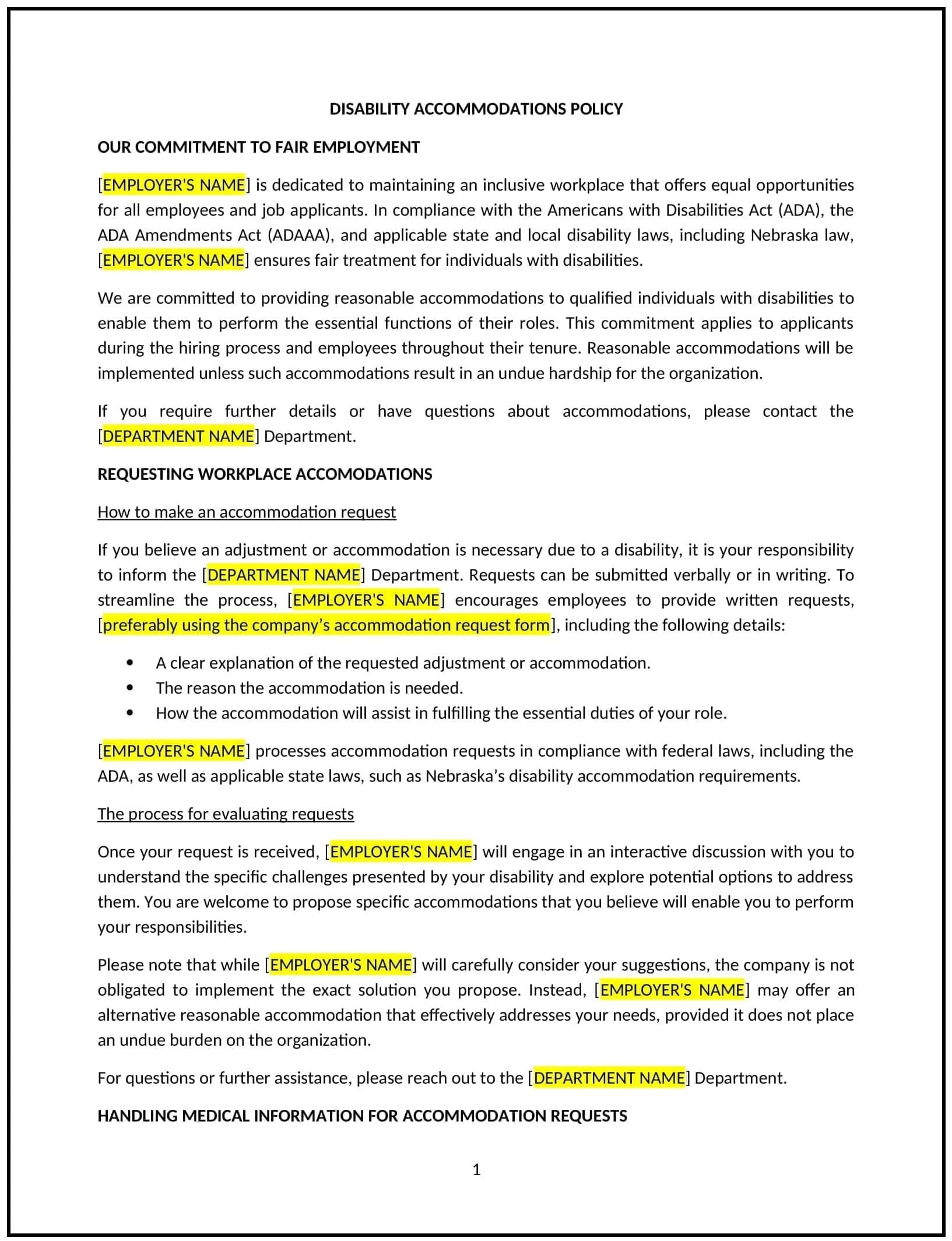Disability accommodations policy (Nebraska): Free template
Got contracts to review? While you're here for policies, let Cobrief make contract review effortless—start your free review now.

Customize this template for free
Disability accommodations policy (Nebraska)
A disability accommodations policy helps Nebraska businesses define how they will provide reasonable accommodations for employees with disabilities, ensuring that they can perform their job duties effectively. This policy outlines the procedures for requesting accommodations, the types of accommodations that may be provided, and the responsibilities of both the employer and the employee in the accommodation process. It is designed to promote inclusion, support employee well-being, and ensure equal opportunity in the workplace.
By adopting this policy, businesses in Nebraska can foster a diverse, inclusive work environment, support their compliance with disability laws, and demonstrate their commitment to supporting employees with disabilities.
How to use this disability accommodations policy (Nebraska)
- Define disabilities: Clearly explain what constitutes a disability under the policy, including physical, mental, or sensory impairments that substantially limit one or more major life activities. Ensure alignment with Nebraska and federal laws, such as the Americans with Disabilities Act (ADA).
- Set the accommodation request process: Outline the steps employees should take to request accommodations, including who to contact, the required documentation (if any), and the timeline for requesting and reviewing accommodations.
- Identify types of accommodations: Provide examples of reasonable accommodations that the business can offer, such as modified work schedules, assistive technologies, physical workspace adjustments, or job restructuring. Be specific about what accommodations may be feasible in the context of the company’s operations.
- Clarify the interactive process: Emphasize the importance of an interactive process between the employee and employer to identify suitable accommodations. Both parties should work together to understand the employee’s needs and find effective solutions.
- Set expectations for documentation: Specify what type of medical or other documentation may be required to support the accommodation request, while respecting the employee’s privacy and confidentiality.
- Define responsibilities: Outline the roles and responsibilities of both the employee and the employer in ensuring that reasonable accommodations are provided, including the employer's duty to engage in the accommodation process and the employee’s duty to cooperate in identifying solutions.
- Address undue hardship: Explain that the business is not required to provide accommodations that would cause an undue hardship, which could be based on factors such as cost, size of the company, or operational impact. Provide a process for determining undue hardship.
- Provide for periodic reviews: Outline how the policy will be reviewed periodically to ensure that accommodations remain effective and relevant, and that the company continues to comply with evolving legal standards.
Benefits of using this disability accommodations policy (Nebraska)
This policy provides several benefits for Nebraska businesses:
- Promotes inclusivity: Providing accommodations ensures that employees with disabilities are treated fairly and can contribute fully to the workplace, fostering an inclusive company culture.
- Improves employee retention: By supporting employees with disabilities, businesses can increase job satisfaction and reduce turnover, which can lead to long-term employee loyalty.
- Reduces legal risk: A formal accommodation policy helps businesses comply with federal and state disability laws, reducing the risk of discrimination claims or lawsuits.
- Enhances company reputation: Businesses that are known for being inclusive and supportive of employees with disabilities are viewed positively by customers, partners, and the community, which can enhance the company’s reputation.
- Increases productivity: By providing necessary accommodations, businesses can ensure that all employees are able to perform to the best of their abilities, leading to improved productivity and overall success.
Tips for using this disability accommodations policy (Nebraska)
- Communicate the policy clearly: Ensure that all employees are aware of the policy and know how to request accommodations if needed. Consider including information in the employee handbook or on the company intranet.
- Maintain confidentiality: Respect the privacy of employees who request accommodations by keeping their medical information and accommodation details confidential.
- Be flexible and open to dialogue: The accommodation process should be flexible and collaborative, with an emphasis on finding mutually beneficial solutions.
- Regularly review accommodations: Periodically check with employees who have received accommodations to ensure that the accommodations continue to meet their needs and are effective.
- Monitor for undue hardship: Regularly assess whether providing accommodations results in undue hardship, and work with employees to explore alternative solutions when necessary.